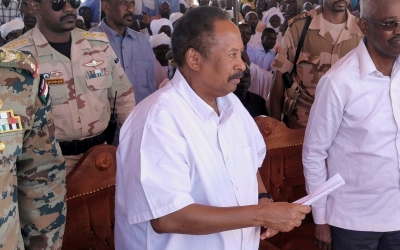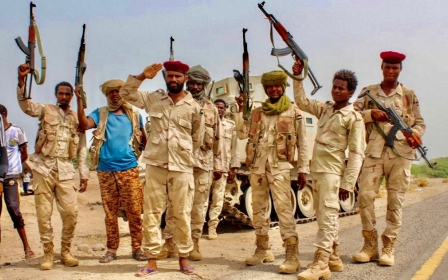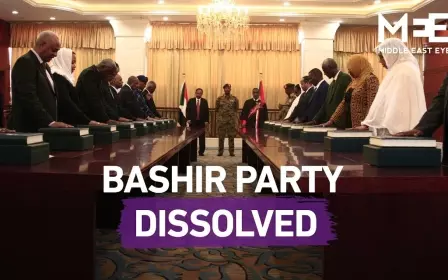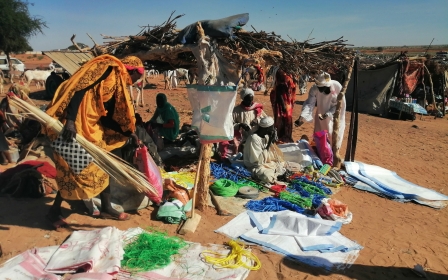Sudan's Hamdok acts against 'terror groups' in bid to end US sanctions
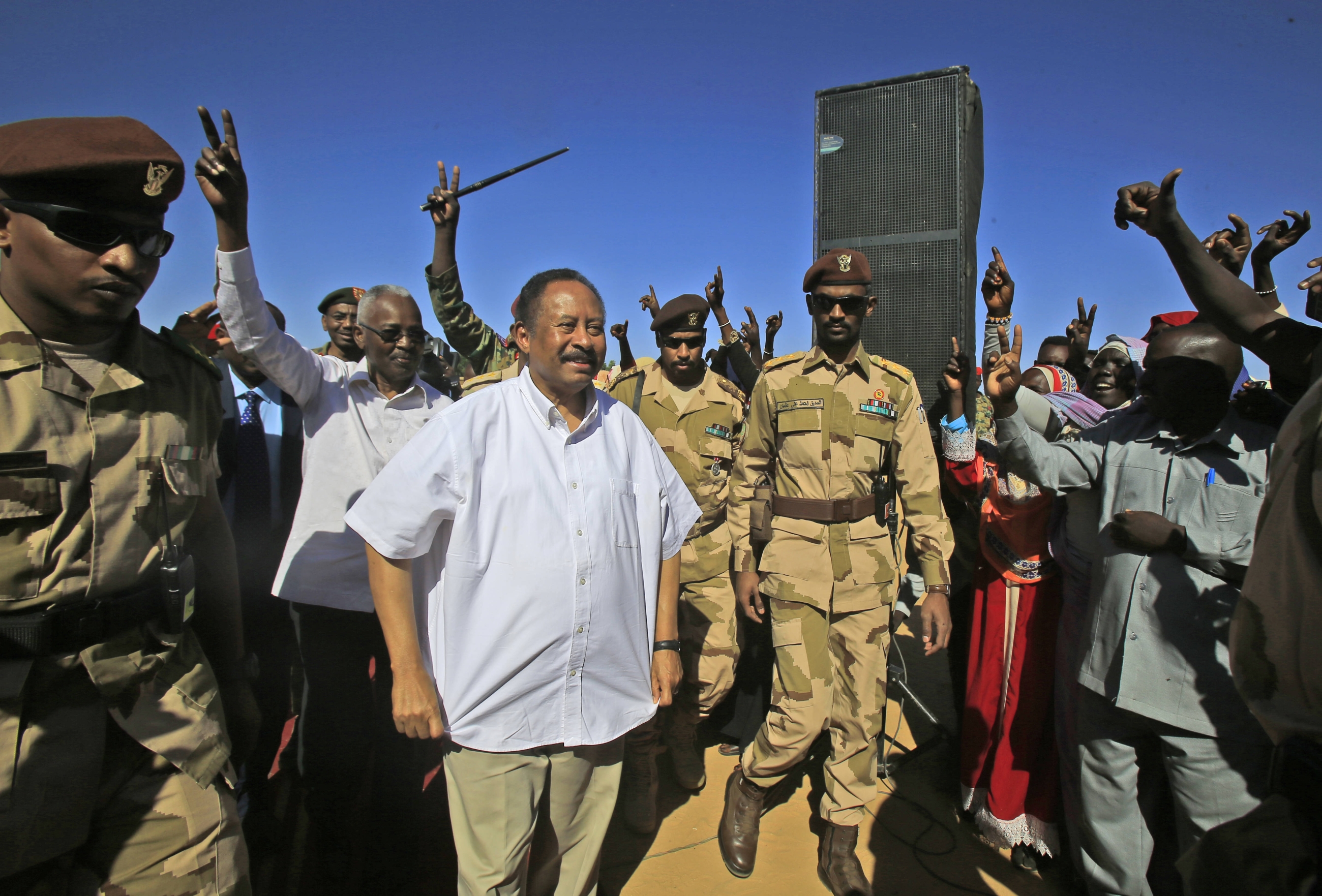
Earlier this month, Sudan's Prime Minister Abdallah Hamdok became the first leader of the country to visit Washington since 1985 as he bid to have his country removed from the United States list of state sponsors of terrorism.
During Hamdok's five-day trip, US Secretary of State Mike Pompeo announced that the two countries planned to begin exchanging ambassadors again after a 23-year gap.
Following the visit more than three decades ago of then president Gaafar Nimeiri, who attended a meeting with president Ronald Reagan in the White House, relations between the two countries sharply deteriorated as instability and military coups rocked the African country.
The rise of Omar al-Bashir to power in 1989 further poisoned relations with successive US administrations until his removal in April.
In 1993, Sudan was placed on the US list of countries sponsoring terrorism after Khartoum hosted the late al-Qaeda leader Osama bin Laden and other militant Islamist leaders from different parts of the world.
The US imposed more economic sanctions in 1997 and doubled them in 2007 after the outbreak of civil war in Darfur.
Despite the US lifting economic sanctions against Sudan in October 2017, the country has failed to see much benefit because its continued inclusion on the terrorism list prevented the country from reintegrating with the global banking system.
'On the right track'
In a bid to remove the remaining US sanctions, Sudan's security organs have mounted a campaign against certain proscribed groups in the country.
A reliable Sudanese source close to Hamdok's office disclosed to Middle East Eye that the government will close the offices of foreign groups designated as terrorists by the US, including Hamas and Hezbollah.
Meanwhile, Sudan's army announced last week, during Hamdok's visit to the US, that it had arrested six Chadian nationals belonging to the militant Nigerian group Boko Haram on the border with Chad and that they had been handed over to the Chadian authorities.
Upon his return from the US, Hamdok said that the process of lifting the sanctions against Sudan may take some time due to procedures in the US, but stressed that: "We are going on the right track."
Stating that "cooperation over counterterrorism is an ongoing process," the prime minister said that he and Sudanese chief of intelligence Mustafa Dambalab had visited the headquarters of the Central Intelligence Agency and met its director, Gina Cheri Haspel, during the US trip.
Fundamental change
Economic sanctions imposed on the government of Bashir strongly impacted Sudan's economy, creating hardships that contributed to the successful ousting by the army of the former president in April after four months of continuous nationwide protests.
Bashir and his now banned Islamist National Congress Party were accused of supporting Hamas, Hezbollah and other Islamist movements that are internationally designated as "terrorist groups".
The Sudanese source who spoke to MEE, who asked for anonymity because he was not authorised to talk to the media, said: "The government will close the offices of Hamas and Hezbollah and any other Islamic group designated as terrorist groups that has presence in Sudan, because Sudan has nothing actually to do with these groups and the interests of Sudan are above everything.
"Actually they have hidden their presence in the past few years but we won't tolerate any individual's presence in the future."
Faisal Mohamed Salih, Sudan's minister of information and a spokesman for the government, was contacted by MEE but he did not respond to the calls.
A US country report on terrorism in 2016 said: "Reports indicate that the Government of Sudan has ceased providing Hamas with any direct support as they did in years past."
Writing last week, former US diplomat Cameron Hudson said: "When the United States under the Obama administration last looked at delisting Sudan from the State Sponsors of Terrorism list, there were additional sticking points that have still only been partially resolved.
"First was the government’s renunciation of support for Hamas and Hezbollah, the latter of which still maintained a political office in Khartoum.
"With the closing of that office and a change in the fundamental nature of Sudan's Islamist regime, Khartoum should now be better positioned to satisfy this US concern."
Sudan's authorities 'to be commended'
In a further move that could help end the sanctions against Sudan, the UN also announced during Hamdok's visit that it had deployed a multi-agency delegation from 3 to 5 December to assess Sudan's current capability to use passenger data to detect and interdict foreign terrorist fighters.
'The full lifting of the sanctions during this phase will also ease the movement and the finance of the terrorist groups'
- Mohamed Ahmed Shigaila, analyst
"The Sudanese authorities are to be commended for inviting this mission and arranging for all relevant stakeholders to participate actively in the assessment," said delegation leader Raffi Gregorian, who runs the UN's Office of Counterterrorism (UNOCT).
"They gave consistent and strong expressions of commitment.
"When implemented properly, the UN CT (Countering Terrorist) Travel Programme can help Sudan meet its obligations under UN Security Council resolution 2396 and demonstrate its willingness to be a credible and reliable partner in countering international terrorism."
The UN Countering Terrorist Travel Programme, which is implemented by the UNOCT, was launched in May, and includes a number of bodies, including several UN agencies, the International Civil Aviation Organisation and Interpol.
Ongoing process
Sudanese political analyst Mohamed Ahmed Shigaila believes that the progress of the Sudanese transitional government in controlling the movement and finance of the organisations designated as terrorists groups is crucial for the US administration to be able to go forward with the lifting of remaining sanctions.
Shigaila, a professor of international relation, told MEE that the US administration is only focusing on counterterrorism, while the Sudanese side is also looking for economic assistance, the lifting of economic sanctions and the normalisation of ties.
"It seems that the two sides have agreed on the gradual lifting of the sanctions in return for the Sudanese efforts in combating and controlling the movement and finance of the terrorist groups," he said.
"I think it's not a bad deal because it [a gradual lifting of sanctions] also takes into account that the full lifting of the sanctions during this phase" would "also ease the movement and the finance of the terrorist groups."
Middle East Eye propose une couverture et une analyse indépendantes et incomparables du Moyen-Orient, de l’Afrique du Nord et d’autres régions du monde. Pour en savoir plus sur la reprise de ce contenu et les frais qui s’appliquent, veuillez remplir ce formulaire [en anglais]. Pour en savoir plus sur MEE, cliquez ici [en anglais].


